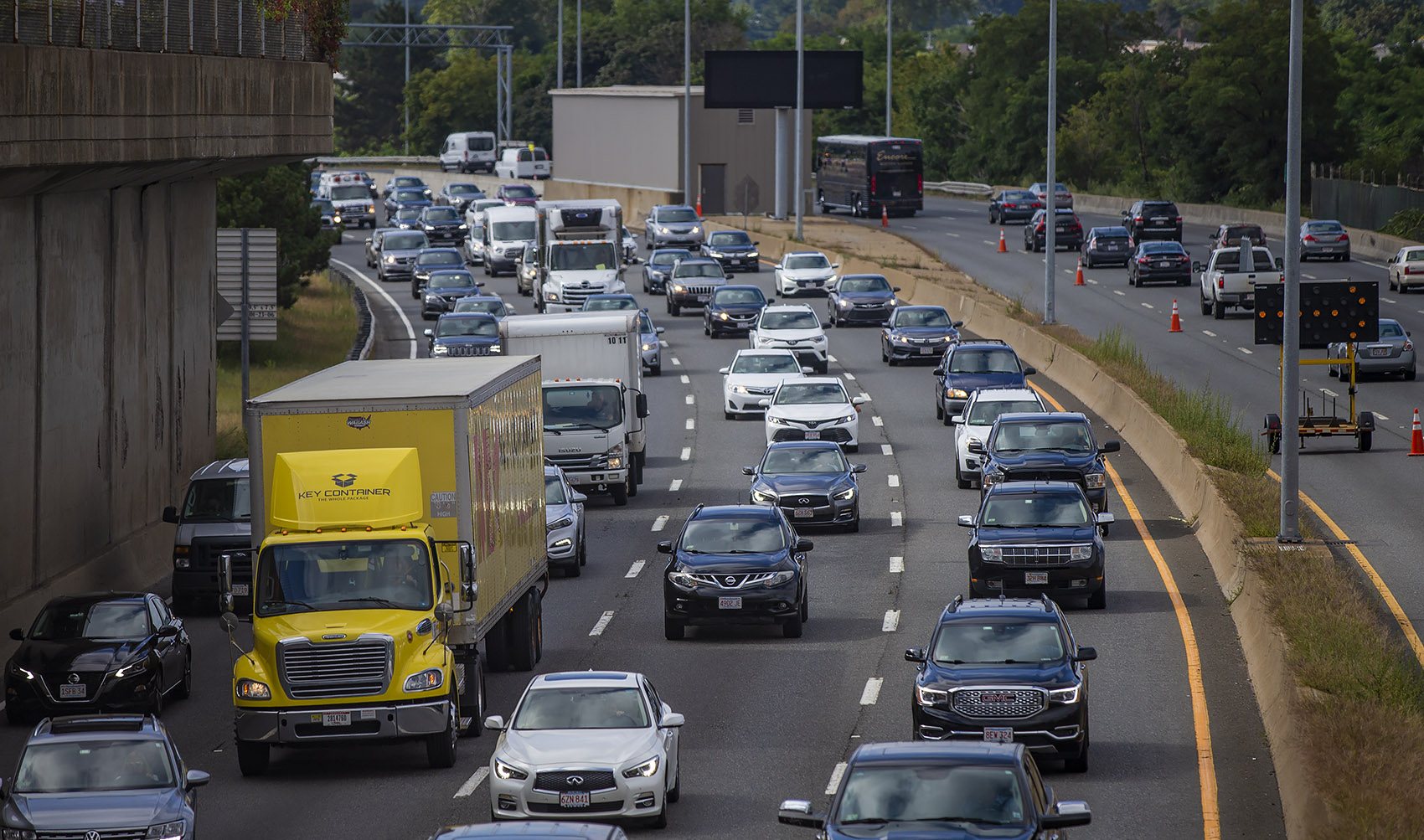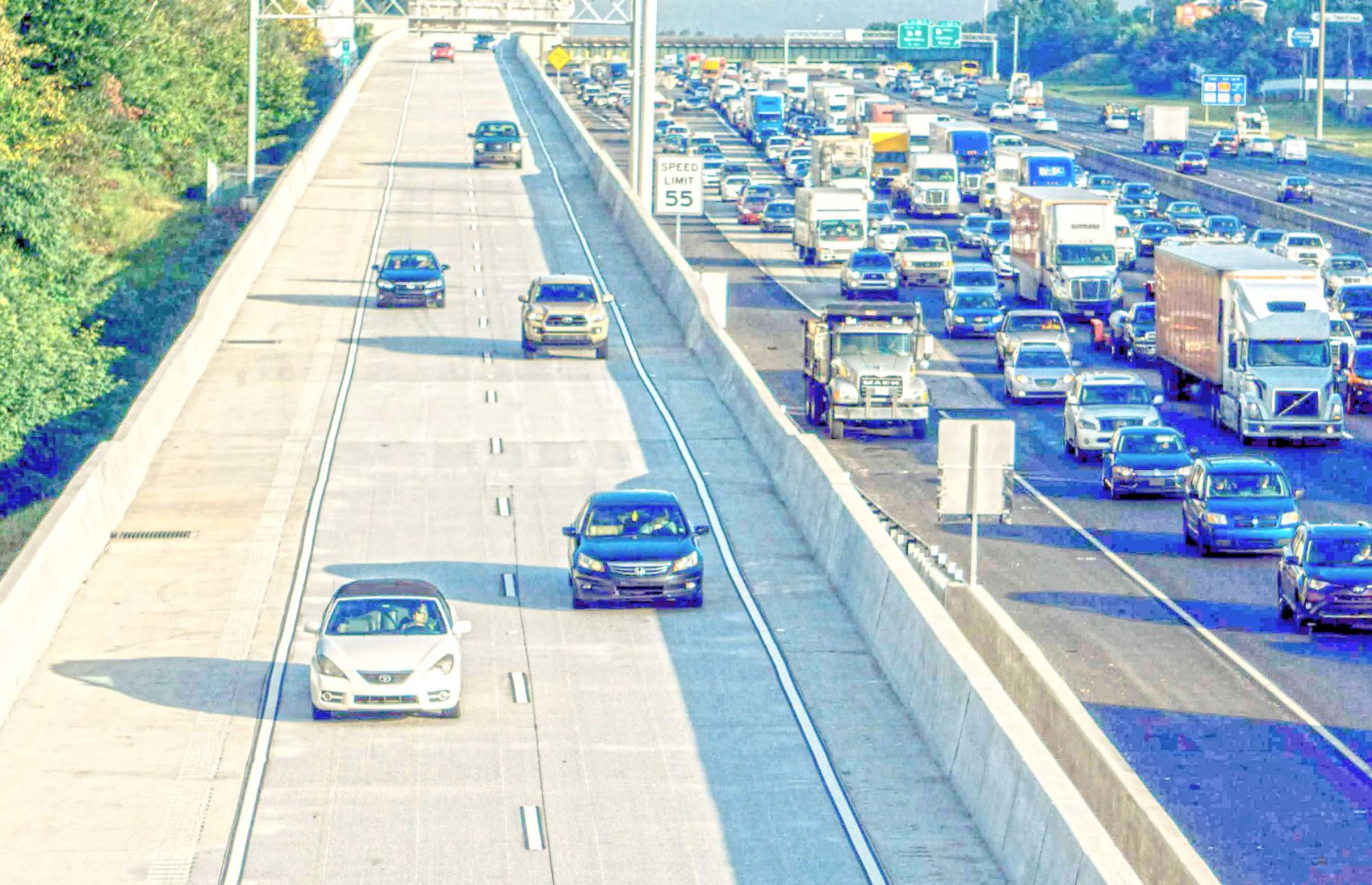Advertisement
Would You Pay To Beat Traffic? Mass. Considers Tolled Express Lanes To Curb Congestion
Resume
You might one day be able to pay to beat traffic in Massachusetts.
State officials are looking at how to create express highway lanes that drivers pay a toll to access — a recommendation out of a congestion report recently issued by Gov. Charlie Baker's administration. The idea has raised concerns about equity and highway expansion. Several states already have express lanes in place with some success.
"Once you get in the lanes, it's like free sailing," says Nick DeAngelo, who lives in Georgia, where there are plenty of express lanes.
On a recent weekday at the start of the evening commute, DeAngelo cruises at 75 mph on Georgia's I-75. He's heading from his software job in Atlanta to his home in Canton, Georgia — about 35 miles away.
"I can see the regular highway beside me, and there are people who are actually stopped, you know, the traffic over there is stopped," DeAngelo says via speakerphone.
Since the express lane opened last year, he saves about 30 minutes on his morning drive and up to an hour or more in the evenings.
"You know, it used to just be when you told people you worked in Atlanta, they're just, 'Oh my God, that commute,' but now it's like, it's not an issue," DeAngelo says.
Georgia has over 60 miles of express lanes and plans to eventually build a 120-mile network. The lanes vary in price depending on traffic. If traffic increases, the price of the lanes increases too. The idea is that some drivers, like DeAngelo, will move out of the general lanes and into the express lanes — and ideally, speed things up on both sides in the process.
This particular trip costs DeAngelo $2. He spends about $10 a week total to use the lanes. He says it's worth it, but he does have his limits.
"If it's anything more than $2, I try not to use it. I'm just a cheapskate at heart," DeAngelo says with a laugh. "I've seen them where they're like $6 and $8 and you know, no. Then you look for the back roads or other ways to get there."
DeAngelo says he was skeptical about the express lanes at first, but now he likes the option. And he says people in Massachusetts should keep an open mind.

The Massachusetts Department of Transportation (MassDOT) says it has already started to analyze where and how the state could add express lanes to highways in Greater Boston, including the Southeast Expressway.
Federal regulations prohibit taking away an existing travel lane. So, the state is looking at two ways to make this work, says Transportation Secretary Stephanie Pollack. It can convert carpool lanes into express lanes. But there are few of those currently in the state. The other option is to build more lanes on highways.
But that approach doesn't sit well with Chris Dempsey, the director of the advocacy group Transportation for Massachusetts.
"We should be focused on pricing the existing highway assets we already have," Dempsey says. "The problem is not that we don't have enough road space in Massachusetts. The problem is that we're not managing the road space that we have."
Dempsey says the state should take a closer look at smart tolling. That's when tolls vary based on traffic. So tolls are higher during peak traffic and lower in off-peak times.
"Of the top 10 largest metropolitan areas in the country by population, Greater Boston is the only one that does not do some sort of time of day pricing on its tolled roads. The only one. And we don't think it's a coincidence that we also have the worst traffic," Dempsey says.
The state's tolled roads currently include the MassPike, the Tobin Bridge and the Boston tunnels.
But state officials believe express lanes — also called managed lanes — will have more impact on congestion. (The state congestion report suggests smart tolling wouldn't address the worst areas of congestion, like Interstate 93 and Route 2.)
"We have seen data that when you add managed lanes, the travel speeds in the managed lanes are higher and the travel speeds in the adjacent un-tolled lanes are higher at the same time," Pollack said at a recent National Governors Association summit in Boston about traffic congestion. "Obviously if there's a win-win like that to be had, it'd be irresponsible not to take a look at it."
Data have shown that express lanes sped up commutes for drivers in toll lanes and free lanes in some states like Georgia and Virginia, though there are questions about how long those results will last.
There are also questions about fairness. Express lanes get knocked for only being available to people who can afford them. They're sometimes referred to as "Lexus lanes."
The Baker administration pushes back on this type of criticism.
"Of all the types of pricing that are currently being debated, we actually think managed lanes are the most equitable because by definition, there is a lane right next to it that's free and that lane is performing better too or we wouldn't be doing the managed lane," Pollack says.
The express lanes would also be free for shared rides and buses to allow more people to benefit from them, Pollack adds.
Eileen McAnneny, president of the Massachusetts Taxpayers Foundation, says express lanes are worth exploring but the state should also try to get people to ditch their cars altogether by adding tolls.
"There are a lot of roads in Massachusetts that we don't toll that we could use that money to help invest in public transit to accelerate the improvements and the modernization so that we have public transit as a viable alternative," says McAnneny, who was also vice chair of the governor's commission on the future of transportation.
There's no single solution to traffic. The state report on congestion makes several other recommendations, including improving public transit and increasing telecommuting.
While the state has started an analysis of managed lanes, MassDOT says there's no timeline for when drivers might have them as an option to beat traffic.
This segment aired on September 5, 2019.
